How to Say Yes in Korean: A Beginner’s Guide
Embrace the Power of Agreement: Discover How to Say Yes in Korean!
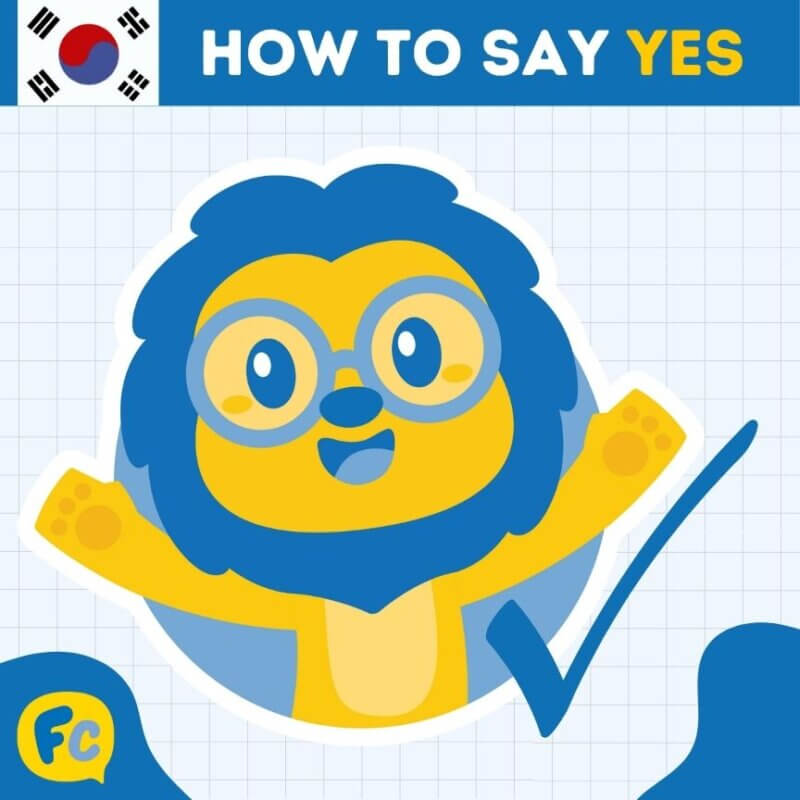
☑️ YES is a simple word that can answer so many questions. Whether something requires your affirmation, agreement, willingness, or approval, a simple yes does the magic.
We can’t emphasize how important respect is to Koreans.
YES, it’s a big deal for us. If you could master the different ways to say Yes from 존댓말 (jondaen-mal) to 반말 (ban-mal), you will unlock yourself to a variety of conversations.
Let’s uncover How to say “YES” in Korean!
⬇️ Interested in one of the contents below? Clicking on the link will bring you to your preferred section!
How to Say Yes in Korean | Three Basic Ways to Say Yes
How to Say Yes in Korean | Other Ways to Say Yes in Korean
How to Say Yes in Korean | Quiz
How to Say Yes in Korean | FAQ
How to Say Yes in Korean | Three Basic Ways to Say Yes
You probably know by now that Honorific systems are an important part of the Korean language. Here are three basic ways to say yes from most formal to casual.
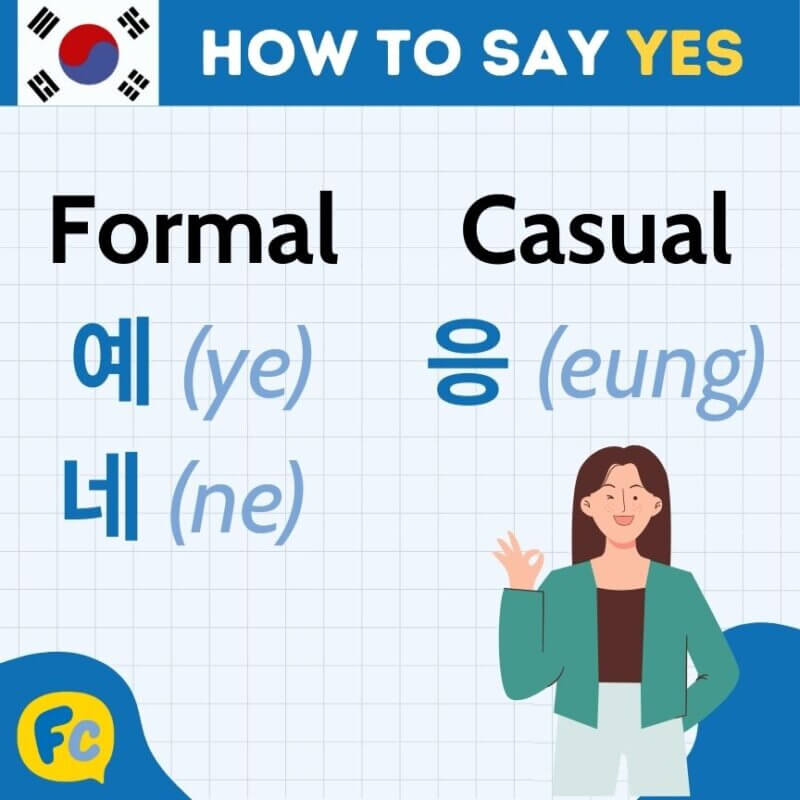
예 (ye) – Formal
👉 Here is a YES that probably sounds familiar. 예 (ye).
It’s pronounced like yeah but with a shorter sound. Although yeah is used for casual yes, in Korean it’s quite the opposite.
Example 1:
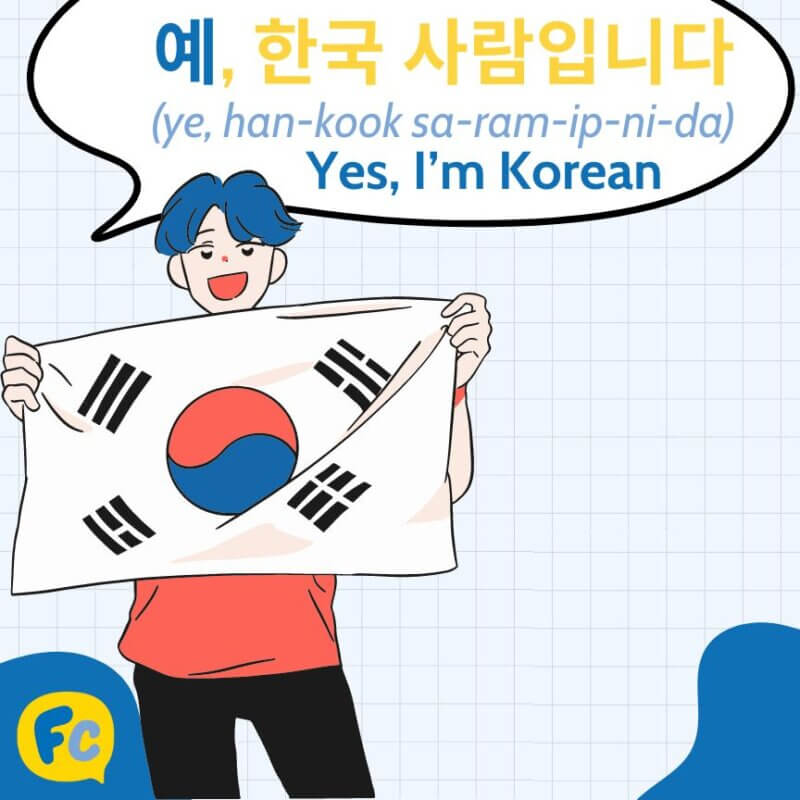
한국 사람입니까?
(han-kook sa-ram-ip-ni-kka)예, 한국 사람입니다
(ye, han-kook sa-ram-ip-ni-da)Example 2:
음악 좋아합니까?
(eum-mak-jo-a-ham-ni-kka)예, 좋아합니다
(ye, jo-a-ham-ni-da)네 (ne) – Formal
👉 네 (ne) is probably the most common way to say YES. This is as equally formal as 예(ye) but could also be used in less formal situations.
예 (ye) used to be more popularly used in the old days, but now 네 (ne) is the way to go.
Example 1:
한국 사람입니까?
(han-kook sa-ram-ip-ni-kka)네, 한국 사람입니다.
(ne, han-kook sa-ram-ip-ni-da)Example 2:
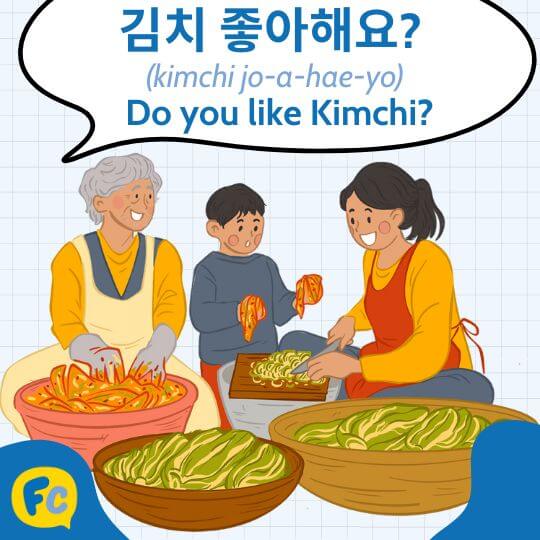
김치 좋아해요?
(kimchi jo-a-hae-yo)네, 좋아해요.
(ne, jo-a-hae-yo)Example 3:
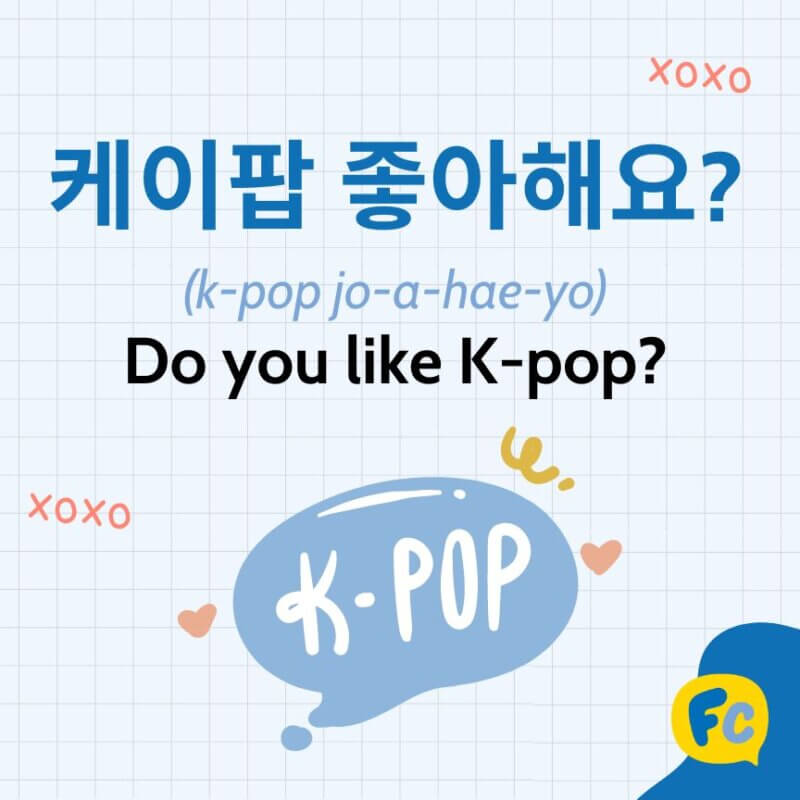
케이팝 좋아해요?
(k-pop jo-a-hae-yo)네, 좋아해요.
(ne, jo-a-hae-yo)응 (eung) – Casual
👉 The most casual way to say Yes in Korean is 응 (eung). We use it to our parents, our siblings, and close friends. You should be aware to never use this with someone you have met for the first time.
For the safest way to say yes on any occasion stick with 네 (ne).
Let’s look at some examples:
Example 1:
밥 먹었어?
(bap-mu-geo-sseo)응, 먹었어
(eung, mu-geo-sseo)Example 2:
잘 잤어?
(jal ja-sseo)응, 잘 잤어
(eung, jal ja-sseo)How to Say Yes in Korean | Other Ways to Say Yes in Korean
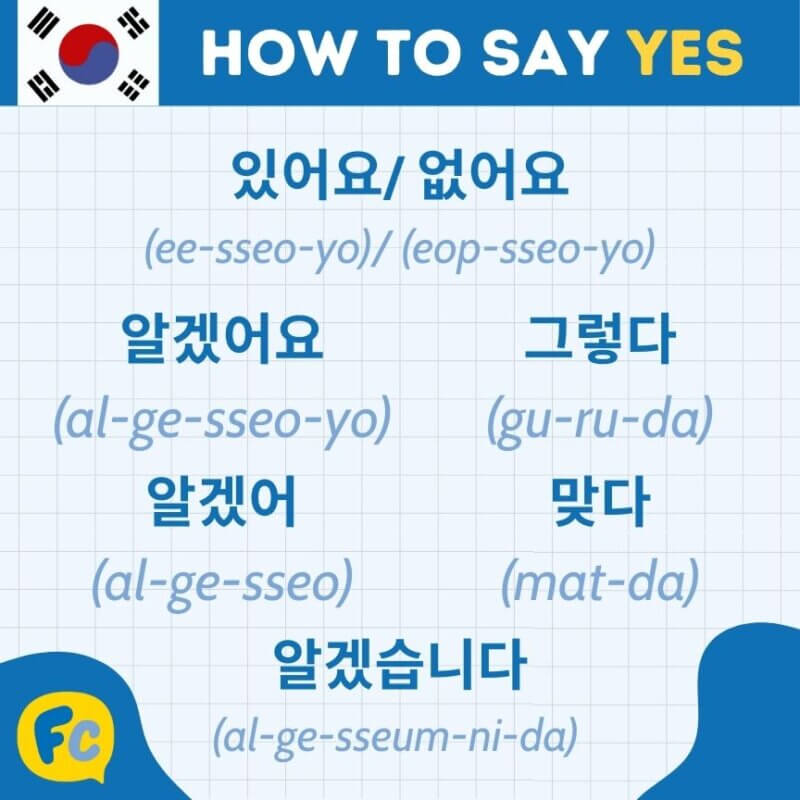
알겠습니다 (al-ge-sseum-ni-da)
알겠습니다 (al-ge-sseum-ni-da) is the most formal form and this means Okay or Got it in Korean.
| Korean Phrase | transliteration | formality |
|---|---|---|
| 알겠습니다 | al-ge-sseum-ni-da | most formal |
| 알겠어요 | al-ge-sseo-yo | less formal |
| 알겠어 | al-ge-sseo | casual |
👉 If you want to tell someone to meet at a certain time, you would use it with 뵙다 (bepda) which is the formal form for see you.
있다가 뵙겠습니다
(it-tta-ga bep-get-seum-ni-da)알겠습니다, 있다가 뵙겠습니다.
(al-ge-sseum-ni-da, it-tta-ga bep-get-seum-ni-da)10시에 뵙겠습니다
10-sie-boep-ge-sseum-ni-da.네, 알겠습니다. 그때 만나요
(ne, al-ge-sseum-ni-da ge-ddae man-na-yo)BONUS || Learn how to say Yes in Japanese and Yes in Spanish!
알겠어요 (al-ge-sseo-yo)
👉 The expression 알겠어요 (al-ge-sseo-yo) is a less formal expression and more commonly used. While we used 뵙다 (bepda) – see you above in the most formal form, we can use both 뵙다 (bepda) or 만나다 (man-na-da) – a less formal way to say see you, with 알겠어요 (al-ge-sseo-yo).
📌 Note that you can’t use 만나다 (man-na-da) when speaking to someone older than you or to someone that you need to show the most respect to. This is why you are only able to use 뵙다 (bepda) in the first example.
Going back to our example with 알겠어요 (al-ge-sseo-yo):
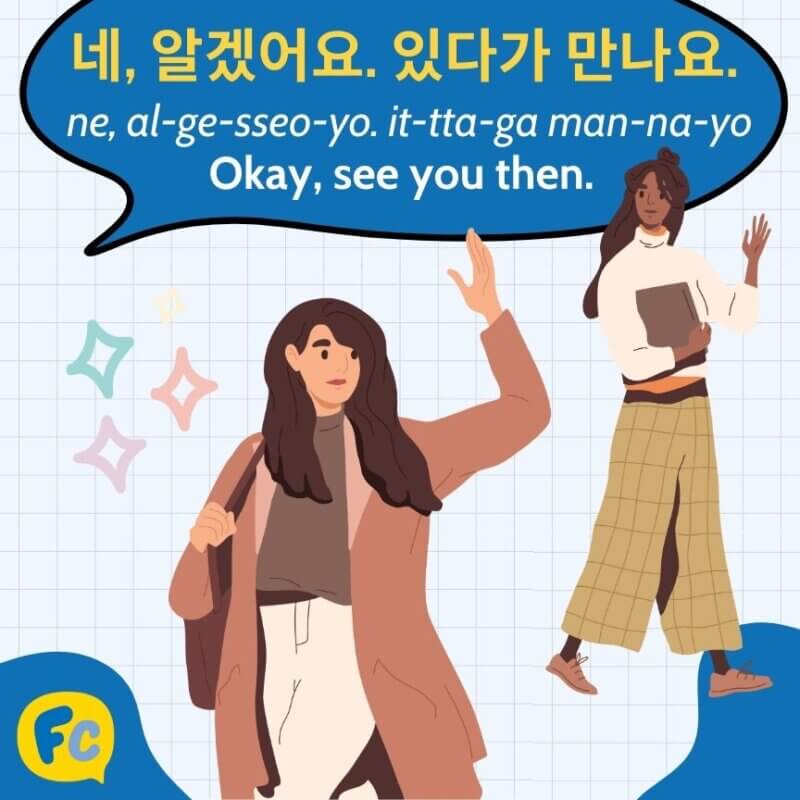
| Korean | Transliteration | English |
|---|---|---|
| 있다가 만나요 | it-tta-ga man-na-yo | See you then |
| 네, 알겠어요. 있다가 만나요 | ne, al-ge-sseo-yo. it-tta-ga man-na-yo | Okay, see you then |
| 10시에 만나요 | yeol-ssi-ye man-na-yo | See you at 10:00 o’clock |
| 네, 알겠어요. 10시에 만나요 | ne, al-ge-sseo-yo. yeol-ssi-ye man-na-yo | Okay, see you at 10:00 o’clock |
알겠어 (al-ge-sseo)
👉 With your close friends and family members, you can use 알겠어 (al-ge-sseo) to say yes.
| Korean | Transliteration | English |
|---|---|---|
| 있다가 만나자 | it-tta-ga man-na-ja | See you then |
| 응, 있다가 만나자 | eung, it-tta-ga man-na-ja | Okay, see you then |
| 10시에 보자 | yeol-ssi-ye bo-ja | See you at 10:00 o’clock |
| 응, 그때 보자 | eung, ge-ttae bo-ja | Okay, see you then |
맞다 (mat-da) – That’s Right
👉 If you want to say yes to agree with someone, you can use 맞습니다 (ma-sseum-ni-da). Let’s look at some examples using 맞습니다 from the most formal to casual.
| Korean | Transliteration | Formality |
|---|---|---|
| 맞습니다 | ma-sseum-ni-da | Most formal |
| 맞아요 | ma-ja-yo | Less formal |
| 맞아 | ma-ja | Casual |
For example:
| Are You Korean? | Yes, I Am |
|---|---|
| 한국 사람입니까? (han-kook sa-ram-ip-ni-kka) | 네, 맞습니다 (ne, ma-sseum-ni-da) |
| 한국 사람이에요? (han-kook sa-ram-yi-ye-yo) | 네, 맞아요 (ne, ma-ja-yo) |
| 한국 사람이야? (han-kook sa-ram-yi-ya) | 응, 맞아 (eung, ma-ja) |
그렇다 (gu-ru-da) – Yes It is
👉 If you want to affirm that something is true, here is a usual expression you can use. Remember that this isn’t to answer an agree or disagree question. You will use these forms to say yes to facts.
| Korean | Transliteration | Formality |
|---|---|---|
| 그렇습니다 | geu-reo-sseum-ni-da | Most formal |
| 그래요 | geu-rae-yo | Less formal |
| 그래 | geu-rae | Casual |
당연하다 (dang-yeon-ha-da) is the expression to use if you want to agree to something.
| Korean | Transliteration | Formality |
|---|---|---|
| 당연하다 | dang-yeon-ha-da | Of course |
| 당연합니다 | dang-yeon-ham-ni-da | Most formal |
| 당연하죠 | dang-yeon-ha-jo | Less formal |
| 당연하지 | dang-yeon-ha-ji | Casual |
있어요 (ee-sseo-yo) / 없어요 (eop-sseo-yo) – Have / Don’t Have
Last but not least, you can also use 있어요 (ee-sseo-yo) / [speak 없어요 (eop-sseo-yo) when you want to say you have something or don’t have something.
펜 있어요?
(pen ee-sseo-yo)네, 있어요
(ee-sseo-yo)Or
아니요, 없어요
(eop-sseo-yo)Check out more about How to say No in Korean here:
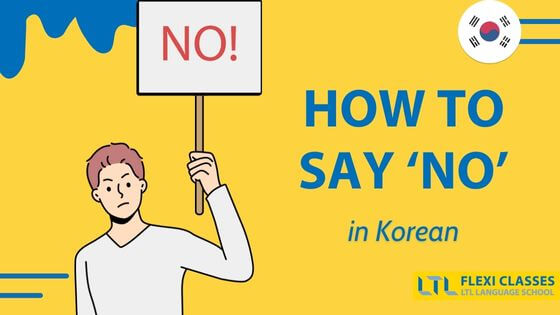
How to Say No In Korean? Sometimes, No Means Yes and Yes Means No… 🤯
Unlock the Secrets of Native-Sounding Korean // the Art of Saying No 👉Here is an interesting topic of discussion, saying no in Korean. To begin with, the concept of no isn’t as simple because Koreans prefer not to be blunt…
If there is one YES you will need to remember in this lesson, it would be 네 (ne). If you do want to make sure you remember all the different types of yes we covered, make sure to come back to save this page.
USEFUL VOCABULARY
👇 We should have you pretty well covered with the following vocabulary and phrases:
| Korean | Transliteration | EnglisH |
|---|---|---|
| 예 | ye | Yes (formal) |
| 네 | ne | Yes (common/formal) |
| 응 | eung | Yes (casual) |
| 알겠습니다 | al-ge-sseum-ni-da | Okay / Got it (most formal) |
| 알겠어요 | al-ge-sseo-yo | Okay / Got it (less formal) |
| 알겠어 | al-ge-sseo | Okay / Got it (casual) |
| 맞습니다 | ma-sseum-ni-da | That’s right (most formal) |
| 맞아요 | ma-ja-yo | That’s right (less formal) |
| 맞아 | ma-ja | That’s right (casual) |
| 당연하다 | dang-yeon-ha-da | Of course |
The next step is to turn theory into practice. Make sure to stay tuned for more exciting Korean language and cultural tips.
- Korean Blood Type Personality: What Your Blood Says About You
- What is KakaoTalk? How to Use Korea’s #1 Messaging App
- How to Say GoodBye in Korean // Informal to Formal Phrases
- Korean Games: From Childhood Challenges to Drinking Games
- Hanbok // The Complete Guide to the Traditional Korean Clothing
How to Say Yes in Korean | Quiz
Have you correctly learned the Korean vocabulary on this page?
Have a try right now and get immediate results:
How to Say Yes in Korean | FAQ
What is a casual way to say Yes in Korean?
For informal and casual situations, you can say 어 (uh) to mean ‘yes’
What is a casual way to say No in Korean?
아니 (ani)
How do Koreans write yes in text messages?
ㅇㅇ – This is a short form to say 응응 (eung eung) which means yes in casual form
Want More From LTL?
FANCY LEARNING KOREAN? Check out our online Korean courses here.
We offer a 7-day free trial to all online students where you can study Korean 24/7.
Want to study Korean in Korea instead? Our Korean courses in Seoul can either be taken in small groups of no more than 5 students or individually for a more tailored experience.
We even offer incredible homestay experiences in Seoul too.
To top it all off, it certainly doesn’t end with Korean. Check out the other languages we teach 👇🏻










